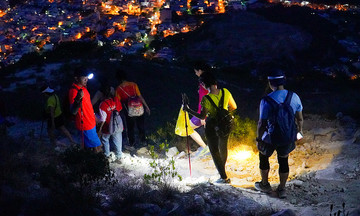Jon Morgan, co-founder of business consulting firm Venture Smarter, noticed something "odd" about a Gen Z entrepreneur he was advising. Her online persona didn't match her reality.
The 23-year-old client spent 18 months crafting a "luxury travel" identity, leading people to believe she lived a lavish lifestyle and earned at least 500,000 USD annually. In reality, her yearly spending was 12,000 USD, far less than her online portrayal.
 |
Young people today travel more and more luxuriously, but also borrow more. Photo: CNBC |
Young people today travel more and more luxuriously, but also borrow more. Photo: CNBC
Morgan explained that she would purchase 200 USD day passes to exclusive Miami beach clubs, taking 400 photos during her six-hour stay. These hourly passes were cheaper than staying at the resort. She then strategically posted these photos over eight weeks, creating the illusion of frequent luxury resort stays.
She also confessed to Morgan about "bribing" concierges with small amounts of money for access to hotels. "For a 50 USD tip, they would let her into the rooftop pool area or the Four Seasons lobby for 30 minutes to take photos," Morgan said.
Her strategy worked. Her Instagram following grew to 85,000, captivated by her seemingly extravagant lifestyle.
But her goal wasn't just fame. She aimed to monetize her online presence, securing brand deals worth 180,000 USD per year.
According to April data from travel insurance marketplace Squaremouth, Gen Z now spends an average of nearly 12,000 USD on summer trips, exceeding other generations. In 2025, 31% of Gen Z travelers plan to borrow money to fund their travels, according to a Bankrate survey. And for many, these luxurious vacations are merely a facade. Instead of documenting the entire trip, they select only the most "Instagrammable" moments, said Mohd Rizwan, director of Travelosei.
American property manager Daniel Rivera observed a similar situation with a tenant. The 24-year-old tenant showcased a 400 USD-per-night Miami Airbnb during a trip, despite struggling to afford her 1,800 USD monthly rent.
"She later admitted to me that she and six friends split the 400 USD nightly cost to capture photos by the luxurious pool," Rivera said. She then posted these photos online, creating the impression of a weeks-long lavish vacation.
Rivera noted that rental applications from Gen Z often reveal how they finance their lifestyles. During the application process, he found that over 30% had loan histories, often marked as "vacation funding." These applicants also tended to have high debt-to-income ratios and maxed-out credit cards.
Anh Minh (CNBC)












